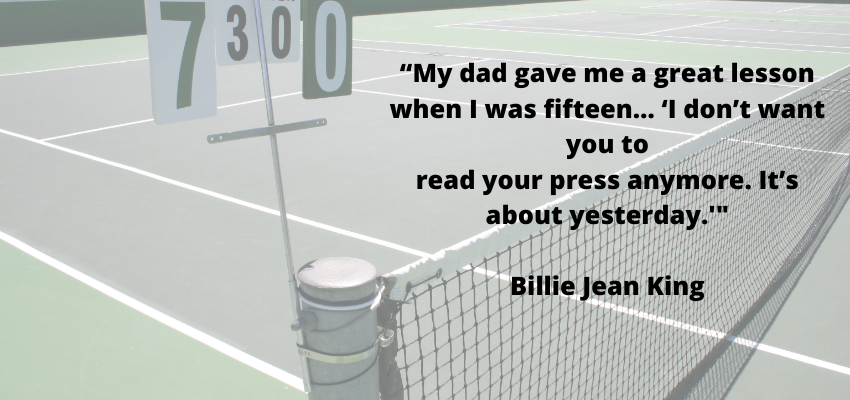By Darius E. Bennett, Esq.

At age 15, Billie Jean King lost a match 6-0, 6-0. For those readers uninitiated in how wins and losses are measured in tennis, that score evinces that Billie Jean did not win one game before eventually losing the entire match; that is, out of twelve games played to determine the outcome of the match, Billie Jean lost all twelve! Embarrassingly, that information was published on the front page of the Long Beach Press Telegram, her local newspaper. In her interview with Venus Williams, published decades later in Venus’ book Come to Win, Billie Jean recalled decrying, “I’ve won all these different matches and they put this one on the front page finally.” It was in response to this exclamation that Billie Jean’s father advised, “I don’t want you to read your press anymore. It’s about yesterday.” She reflected at the time, and still agrees today, “Boy, [was] he right. I lost yesterday, I didn’t lose today. What am I doing today?” The heart of Mr. Moffit’s advice was that yesterday is gone, and we cannot have it again. Toiling over the details and prompts that simply refresh one’s memory of time immutable will diminish one’s focus on the present. We have the present. That is especially apposite in today’s climate, whose mood is encumbered by sudden and constant job loss. Here is a fact: The moment someone loses her job, that former job is immediately in the past.
This additional thought might be toilsome, and a touch vexatious, but may also be comforting: What if your boss did you a favor by separating you from your job?
Feeling discarded is nearly unavoidable in the wake of a sudden job loss, until one realizes that losing a job is not being discarded, rather freed. When I lost my job in 2013, I called my parents to vent frustrations I had amassed for months at that job and, subconsciously, to seek help exploring my soul for answers to the “how”, “why”, “what could I have done” thoughts-of-the-past with which my mind assaulted and prodded me. I, unfortunately, could not subdue the feeling of displacement in that first call. In fact, it was during a call with my father a year later that I finally began to convalesce. At the time, I would walk 4 miles a day, 5 days a week, late at night, often at midnight. One of my father’s weekly calls unusually coincided with one of these late-night walks. (I had speculated that he had forgotten to call that week!) He could hear the sounds of night, and the occasional traffic characteristic of the midnight hour. He wondered if it was safe for me to be out at that time. I replied, “I’m broke, jobless, and have a phone that is three years old. Dad, no one wants me. I’ll be fine.” There was a very brief silence before the resonating boom of his drawling Southern bass reached through the phone, traveling miles, across state borders, to deliver his concern in seven impactful, very prescient words, “We want you, your mother and I.” My mind stumbled clumsily to regain its wits, and I worked quickly to lean the full weight of my heavy heart against the evidently diaphanous façade my father had carefully and tactfully begun to dismantle. He talked me through all 4 miles of that walk, about the good things I had done with my day, and I began to recover. I continued the walks, but started them considerably earlier. On one such now-routinely-contemplative walk, I recalled sound advice received from someone who was prohibited by her job from giving advice. Furtively, she imparted, “Every job ends in one of three ways: You either walk out, die out, or get asked to leave. Either way you still have all the skills. That doesn’t change.”
Those long walks, and the thoughts they inspired, were the shift that allowed me to embrace present-mindedness, and seize present opportunities’ potential to be greater than the past.

